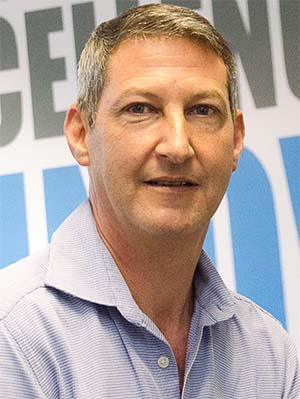The Gizzu brand has come to represent products and components that resellers can rely on to make their customers’ systems work.

Ryan Martyn, founder and sales & marketing director of Syntech.
“There’s a good reason for this”, says Ryan Martyn, founder and sales & marketing director of Syntech: “the brand is carefully curated and designed to be a 100% fit for South African market conditions.”
“We have always distributed class-leading technology products but sometimes the products were not suitable for our market and the price points made them inaccessible for South African consumers.” Says Martyn, “We needed a brand to give Africa access to the best available products at more affordable price points.”
To do this, Martyn and Syntech MD Craig Nowitz – a long-time veteran of the South African distribution industry – decided to leverage the relationships they had built up with Chinese suppliers and manufacturers to jointly develop top-quality products designed for local conditions.
And thus the Gizzu brand was born: products designed and specified by the Syntech team and manufactured to stringent standards in China.
Initially the range consisted of components like cables, power banks and adapters. “The superior quality of these products was a hit with customers,” Martyn says. “Cables are a prime example of why attention to detail matters, like our 4k cable with a solid copper core that enables full transmission speeds.
“Customers quickly started realising that Syntech’s Gizzu brand offered them top quality products at a very cost-effective price point.”
Syntech began to expand its horizons. “Customers needed more than cables,” Martyn says. “South African users are facing a lot of more pertinent challenges that require top-quality solutions, with load shedding high on that list.”
Back in 2018, Martyn and Nowitz realised that load shedding was going to be with us for a while and started looking for the immediate user pain points that could be addressed.
The first Gizzu product in the power range was a mini-UPS to power Internet routers, so that users could stay online when load shedding struck.
“The first products in this range were quite basic, with single-spec and single output voltage,” Craig Nowitz, CEO of Syntech, remembers. “But with our tight-knit reseller network and high focus on communication, we received valuable feedback that helped us improve the rand and develop a more extensive product portfolio that is unique to Gizzu.”
Over the ensuing years, the product range has expanded from a reasonably simple solution for keeping the Internet on to an extensive offering that embraces lighting, and alternative energy products that combat loadshedding challenges.
Led by the consumer
But how does Syntech decide what to bring in, or how to design solutions?
“We develop a keen understanding the consumers’ specific needs and create innovative solutions using tech,” Martyn explains.

Craig Nowitz, CEO of Syntech.
“We want to do more than offer another generic product, our solutions need to add more value than everything else on the market.” Says Nowitz. “Our customers need to trust that they are buying the latest and greatest, which is why we need to keep on innovating. ”For instance, Syntech is not rushing into the rooftop solar game, Nowitz adds. “What we do have is a fold-out solar panel that consumers can use to charge a power station without needing an electrician – something that is easy and safe to use.”
In an environment as complex and potentially dangerous as electricity provision, Martyn believes consumers need a product they can trust, and that will work right out of the box.
There are many benefits to this approach, he adds, not least of them being accountability if things go wrong. “And by offering an out-of-the-box solution that just works and is accessible, we can help consumers get affordable solar solutions, quickly.”
Made for SA
Syntech believes its Gizzu value proposition is a compelling one for South African customers.
“The products are 100% fit for purpose,” Nowitz says. “And they are designed specifically for South African load shedding conditions.”
“It’s important to remember that most international brands for alternative power products simply weren’t designed to be used three times a day, every day. For instance, typically portable power stations are used for camping and only used occasionally.
“We spent a lot of time designing products that can operate efficiently in our environment.”
For example, Nowitz explains that most load shedding light bulbs take up to 10 hours to charge between uses. “This isn’t good enough for our South African conditions, so we needed to speed up the charging process. As a result, we were able to redesign the product so that the Gizzu light bulb charges quickly, at a higher wattage, and can be dimmed as well.
“We also have an off-grid solar kit that consists of a solar panel, three lights and a battery inverter. There are similar units available on the market but they can take up to 48 hours to charge – which isn’t really useful if customers need to use it every night. We designed ours to charge in five hours, so it’s ideal for load shedding.”
And the products are all plug-and-play, so any consumer can quickly and easily deploy them.
“We have a unique market, so we can’t just bring in solutions designed for the rest of the world. We need solutions that can adapt to varying voltage inputs, can charge really quickly, and be in used continuously,” Nowitz says. “So we have changed the way the solutions are designed to ensure they work for our customers.”
What’s available
Syntech has built the Gizzu range into a line of power products that customers find easy to use and able to meet their needs.
The solution line-up includes:
- Emergency light bulbs in bayonet, screw-in or downlight configurations that charge quickly when the light is on, change from warm white to cool white when load shedding strikes (to conserve power), and can be dimmed as well.
- A solar light kit that is a good off-the-grid solution for people who don’t have access to lights during load shedding, are camping, or live in informal areas.
- Mini UPSs to keep WiFi and the Internet running when the power goes down.
- A range of power stations that have 220V output and can power appliances.
- Fold-out solar panels that allow users to recharge their power stations inexpensively from the sun, and which are particularly useful when power is out for extended periods.
- Volage protector plugs which ensure that any input current is kept within a safe voltage range to prevent appliances from damage caused by surges of dips in power supply. For instance, these plugs prevent computers, HiFi systems and televisions and from being damaged by high voltage, while protecting fridges and freezers from damage caused by low voltages.
- Lithium Iron Phosphate (LiFePo) batteries for alarm systems and gate motors that will last 10-times longer that the standard lead acid batteries, and are much less prone to their life being shortened if drained during prolonged power outages.
“There is also an exciting roadmap of products that we are planning to add to the Gizzu range,” Nowitz says.
One of Syntech’s biggest value-adds is its vertical integration and close relationships with resellers and manufacturers, he adds. “This means that the time it takes from identifying a need to designing a production, getting it into production, finalising product manuals and packaging, and getting it into our warehouses can be as little as three months.
“Other brands simply cannot compete with this great turnaround time; while many of the brands out there are unable to compete with the Gizzu quality.” Says Nowitz
“And, most importantly, all of these solutions are offered at affordable price points for our South African customers.”
A question of trust
Trust is hard to build up, and Syntech has taken years to ensure its products and brands can be trusted by South African consumers.
“We take a detailed interest in the qualification process, and the factories where our products are produced,” says Martyn. “We evaluate samples and robustly test the products. On an ongoing basis, we send products to independent test laboratories to ensure the quality is always of a standard we can trust.”
These third-party tests are used for local compliance, he adds.
Plus, to keep manufacturers up to the mark, ongoing random factory inspections are conducted. “Because if there is any indication that standards are not adhered to, it undermines the integrity of the whole brand,” Martyn adds.
“In such uncertain times, when there are so many problems in South Africa, the least we can do is deliver certainty, trust and a solution that meets the customer’s needs. The world might be falling apart, but our customers can keep their lights, Internet and fridge on.”
Indeed, Syntech even insists on stringent compliance for products that are not regulated in South Africa. “For instance, there are no compliance regulations for lightbulbs in the South African market,” Nowitz explains. “But, even though it’s not required, we still send our Gizzu lightbulbs to the testing labs, where they get the latest IEC results, which are verified and come with a full test report.”
Easy to be a reseller
Since they are all standalone solutions, the Gizzu power solutions are all easy for end users to install, so reseller partners don’t require special skills or training.
“It really is as simple as replacing a battery or screwing in a lightbulb,” Nowitz says. “Resellers don’t need special certification, and no certificate of compliance is required with the devices. So there are no expensive surprises for customers.”


When things go wrong
Gizzu power stations were recently in the news for the wrong reasons: Syntech issued a recall on two models that showed signs of overheating.
Rather than being a cause for alarm, however, Nowitz points out that the recall demonstrates Syntech’s commitment to supplying only top-quality products.
“We issued the recall the minute we realised there was a potential for a very small number of the units to overheat,” he says. “There were never any injuries or any sign of damage to property – just some minor damage to a table when a device overheated.
“We have since learned from our resellers that similar issues have come up with other vendors, and never been addressed.”
“But, from our perspective and given our history as a family business, we wouldn’t be able to sleep at night if people can’t trust our products 100%. So, with an appreciation of excellence and honourable candour, we recalled the products that might possibly cause a problem.”
“In fact, the decision to do the recall was an easy one,” adds Martyn. “When a company is as clear on its core values as Syntech is, making a call to ensure that all customers can continue to trust us explicitly was non-negotiable.
Syntech set up a tool that allows users to check of their particular product is covered under the recall, and give them the option to request either a refund or a replacement.
“The fact that well over 75% of the affected customers opted for a replacement speaks volumes for the confidence they feel in the brand,” Martyn concludes.
